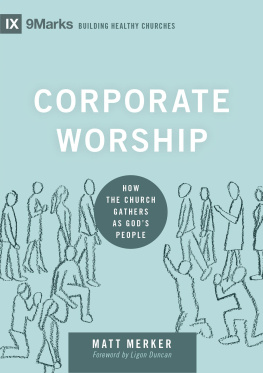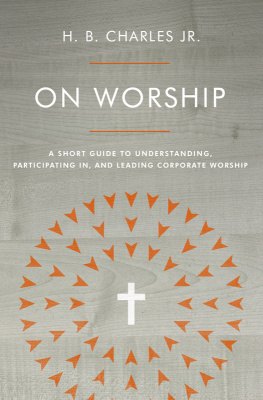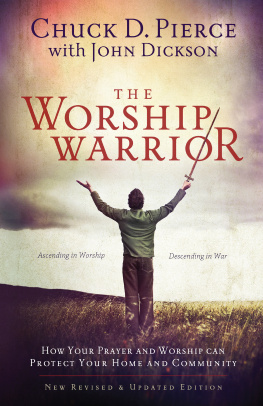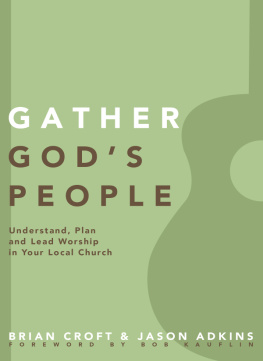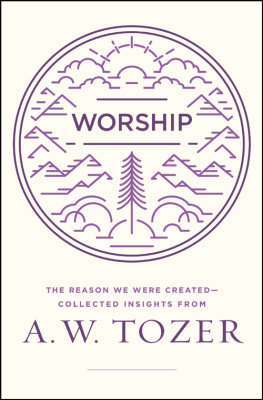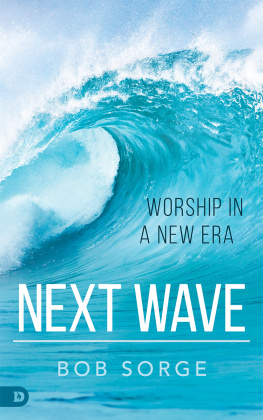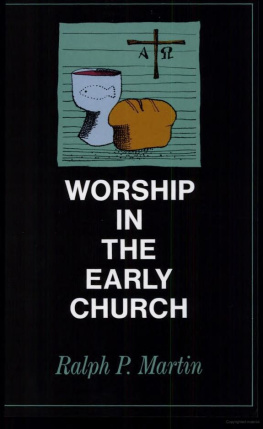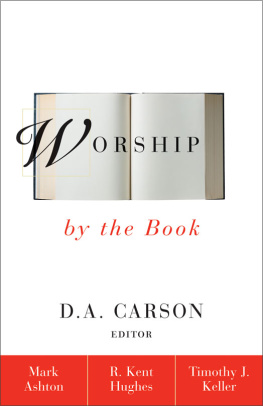Table of Contents
Landmarks
Thanks are due, first of all, to Capitol Hill Baptist Church. Thank you for all that you taught me about corporate worship by gathering each Lords Day. Im grateful to all the elders and members for how you loved, taught, supported, and cared for my family and me for a decade. Thanks to Bobby Jamieson, who encouraged me to pursue this project, rearranged my schedule to help me write, and offered input on the manuscript. And particular thanks to Mark Dever for the investment you have made and continue to make in my life. Your influence permeates this whole book.
Thank you to the wonderful 9Marks staff for your commitment to building healthy churches and for your expert support. Alex Duke transformed this book with his superb editing. Special thanks to Jonathan Leeman for shepherding my initial idea into a completed volume, with lots of advice and improvement along the way.
Thank you to Crossway for your commitment to equipping the broader church with biblical resources and for allowing me to add a contribution to this 9Marks series.
Thanks to the many friends who read part or all of the manuscript and offered valuable feedback: Isaac Adams, Sam Emadi, Amos Evans, Susanna Farmer, Jennifer Gosselin, Drew Hodge, Dave Hunt, Jonny Lim, Matthias Lohmann, Tony Merritt, Jonathan Morgan, Leandro Pasquini, Shanyl Philip, John Sarver, and Shane Williamson. Im especially grateful to Devon Kauflin, who spent several long lunches talking through various chapters and sharing from his deep wells of wisdom.
Finally, thank you to my kind and precious family. I love you, and this book is for you. Erica, your delight in worshiping Christ fuels my own. Lena and Isaiah, I pray that Christ would become precious to you, and that you would join the sacred assembly that ever sings his praise.
My mother shook a tambourine. My younger siblings rattled maracas. My hands played a few simple chords on an out-of-tune piano. Together we sang, Celebrate Jesus , celebrate!
Thats how every day at Merker Home School Academy began: with worship.
Ive been around church music my whole life. In the Vineyard church in which I grew up, we sang simple choruses of devotion. Then, in the Conservative Baptist church of my teenage years, I found myself unwittingly enlisted in a worship war: the organ against the praise band. The band won. This stylistic transition was painful, and quite commonplace in the 1990s. In college, I grew to love hymns both old and new that coupled deep truths with singable melodies. After graduation, I returned to the church of my youth and reenlisted in that praise band.
For decades , I sang to Jesus at home and at Sunday services. I listened to praise and worship albums. I led worship services at youth groups, college fellowships, and even vocationally at church.
And yet, I didnt understand corporate worship.
Then, at twenty-four, I began a pastoral internship. For the first time, I studied what the Bible says about the local church. What I found changed me forever. No longer did I regard the church as an optional add-on to the Christian faith, or a place where really serious believers got together to grow, or a rally designed to attract outsiders through inspiring experience. The church is the bride for whom Christ died. It is the outpost of his kingdom on earth. It is the temple for his Spirit. It is his body. I recognized these images beforehand, to be sure. But now I started to put them together. I saw they have rich implications for what a church does when it meets.
At the same time, I participated in church gatherings every Sunday that were deeply and deliberately congregational. The whole church wanted to be there. Everyone engaged intently. Folks stayed afterwards for an hour to minister to one another. And the whole church sang more loudly and passionately than Id ever heard, even though the musical accompaniment was plain and unremarkable.
I realized theres a connection between how a congregation understands itself to be a church, and the way it worships as a church.
Needless to say, I stayed around for a while. I made that church, Capitol Hill Baptist Church in Washington, DC, my home for a decade. God used its congregational lifeincluding the worship services Ive just describedto grow my faith by leaps and bounds.
Why another book on worship? Ive been asked that question several times. Each time, my answer has been the same: this isnt a book on worship in general. Its about corporate worship.
To be sure, worship by itself is a worthy topic. Were created to be worshipers of God. There is no one Hebrew word in the Old Testament or one Greek word in the New Testament that translates exclusively as worship, because the idea is so pervasive. Scripture calls all people to love, serve, obey, exalt, magnify, sing to, ascribe worth to, and bow down before the one true God. 12:1).
Thats not all, though. A life of worship also involves assembling with Gods people. The New Testament commands believers to meet together (Heb. 10:2425) and gives whole chapters of instruction pertinent to these gatherings (e.g., 1 Corinthians 1114). A church service is different than when several people who all happen to be Christians get together to play sports or watch a movie. Scripture teaches that there is a time when you come together as a church (1 Cor. 11:18). The whole gathering is worship, not just the singing and music. In the preaching, prayers, and everything in between, God ministers to and through the whole congregation for his own glory.
That gathering, that coming together of the church, is what this book is about.
My goal is simple. I hope to show that in order to understand corporate worship, we must understand the local church. When we approach the Sunday service with a biblical view of the church body, it transforms how we engage in gathered worship. My aim is to put the corporate into our corporate worship.
Why does this topic matter? Imagine a group of Christians who are planting a church. Their conversation turns to their hopes and dreams for the Sunday worship gathering.
Brad says that what their church needs is intimate corporate worship . He highlights passionate communion with Jesus . Thats authentic worship, he says, when the Spirit brings us to the throne room in awe and adoration.
Alyssa tells Brad to beware too much focus on personal experience. After all, the Bible calls us to historic, doctrinal corporate worship. We should herald the truth while showing our solidarity with Christians of past generations through ancient creeds and classic hymns.
Rich agrees with Alyssa to an extent, but he urges his friends to focus on liturgical corporate worship. Yes, intimacy and truth both matter, he says, but, when we worship, God forms believers through embodied practices. Were physical beings, so we must appreciate how liturgy shapes our desires, how the rituals of the body train the posture of the heart.
Danielle throws up her hands in frustration. Guys! Everything youre talking about sounds so foreign to unbelievers! She argues for outreach-driven corporate worship. Get rid of the smells, bells, and creeds. Lets play songs our neighbors know, make everything as accessible as possible, and above all, keep the service under an hour.
When we consider how a church should worship, it isnt always exactly clear which of the above perspectives should rank highest. No wonder Christians have argued about corporate worship over the generations. Different believers have different priorities, and our varying theological backgrounds and church traditions point us in various directions.
But much of this confusion can be cleared up if we simply begin with the local church . What is a church? What does Gods Word call churches to do when they gather? Those are the central questions driving this book. As we answer them, well find that the four statements above each have a grain of truth. Corporate worship does involve communion with Christ by his Spirit, and heralding sound doctrine while staying historically rooted, and liturgical formation, and serving as a witness to the lost. My purpose isnt to identify any of those sound bites as the correct one. Rather, its to show how a deep understanding of the church brings clarity to this conversation.

